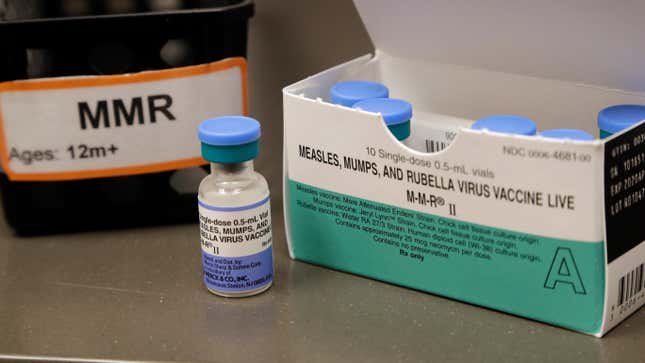
A new report from the World Health Organization and the Centers for Disease Control and Prevention highlights a bleak reality: Measles, the highly contagious but vaccine-preventable viral illness, infected at least 860,000 people and killed over 200,000 worldwide in 2019—a roughly 50% jump in deaths from 2016. Sadly, the covid-19 pandemic is likely to make this situation even worse.
Following the invention of a vaccine for measles in the 1960s, annual cases took a sharp plunge. In the U.S., the establishment of a nationwide vaccine program for childhood diseases led to the local elimination of measles in the year 2000. In 2016, cases globally reached a record low, leading to hopes it could be eradicated everywhere in the near future. But since those optimistic days, things have taken a sharp turn for the worse, especially in Europe.
While there were only 5,000 or so documented cases across Europe in 2016, the next year saw over 21,000. By 2019, progress has slipped so far that the UK and several other countries lost their measles-free status from the WHO. That same year, relatively large outbreaks of measles in the U.S.—sparked by travelers returning from countries where the disease wasn’t contained—almost led to its status being stripped as well. Even still, the 1,200+ cases the U.S. documented in 2019 were more than it had seen since the early 1990s.
Worldwide, according to the new CDC/WHO report released Thursday, there were 869,770 documented cases of measles in 2019, the highest annual number since 1996. Many cases of measles go unreported, so the true number is higher—somewhere around 9 million total, according to the report. It also estimated there were over 207,500 deaths in 2019. That’s half as many deaths as estimated in 2000, but a substantial jump from the 140,000 deaths estimated in 2018. Most measles deaths occur among children under the age of five.
These increases could be seen across the world, but outbreaks were especially large and uncontrolled in Africa and Europe. The only two countries to achieve local elimination for the first time in 2019 were Iran and Sri Lanka. And though there are important regional differences for why cases have spiked, the underlying reason is the same.
“In all WHO regions, the fundamental cause of the resurgence was a failure to vaccinate, both in recent and past years, causing immunity gaps in both younger and some older age groups,” the authors of the report wrote.
Because measles is so highly contagious, it takes a very high vaccination rate to stop it from spreading within communities once it arrives—somewhere around 95 percent. The current vaccine used for measles, a combination shot that also protects against mumps and rubella, requires two doses, further complicating adherence. Adding to that is the anti-vaccination movement, which has contributed to a growing mistrust of vaccines in the U.S. and elsewhere.
So far, cases of measles in 2020 worldwide aren’t looking to be as high as they were last year, possibly in part because of increased physical distancing due to the covid-19 pandemic. But there have already been documented declines in routine vaccinations this year in many countries, including the U.S. Experts at the WHO and elsewhere fear that the pandemic will set back efforts to contain a wide array of infectious diseases such as measles, HIV, and tuberculosis, particularly in already-struggling regions. Measles isn’t the only disease that threatens to overwhelm us, but it’s one of the most preventable.
“Before there was a coronavirus crisis, the world was grappling with a measles crisis, and it has not gone away,” said Henrietta Fore, UNICEF executive director, in a statement released by the WHO. “While health systems are strained by the COVID-19 pandemic, we must not allow our fight against one deadly disease to come at the expense of our fight against another.”